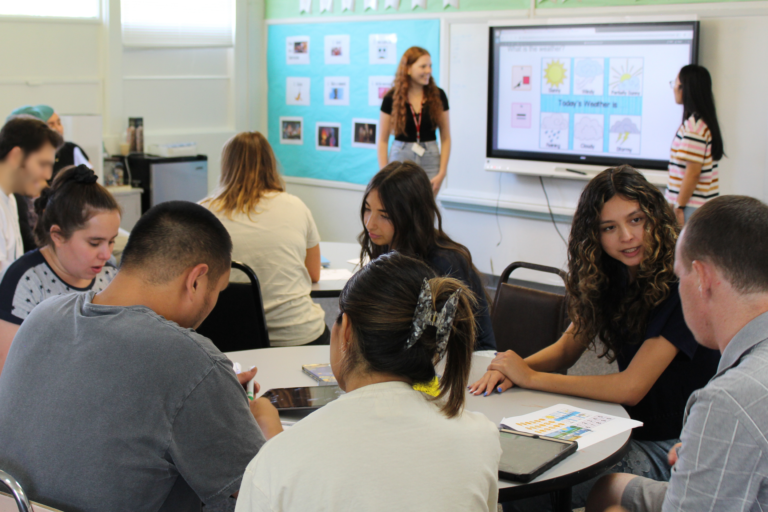
Through a long-standing partnership with Chapman University, graduate interns studying Speech-Language Pathology (SLP) are given the opportunity to work with SLDC students during an annual AAC Camp.
Augmentative and Alternative Communication (AAC) includes a diverse array of high-tech (e.g. iPads) and low-tech (e.g. communication boards) solutions tailored to meet the unique needs and strengths of each individual. AAC empowers SLDC students to better express themselves, leading to higher confidence, stronger relationships, and fuller participation in everyday life. At AAC Camp, campers thrive in self-expression and independence, while interns develop meaningful hands-on experience for their future careers. “AAC is a way to give so many people a voice,” says Marissa Caccavale, AAC Camp and Speech Department Supervisor. “We get a chance to give our students additional support and teach the next generation of speech-language pathologists.”
Marking its 8th year at SLDC’s campus, AAC camp serves as the summer clinical placement for 40 Chapman University graduate level SLP students. Interns in the cohort expertly develop the camp’s daily lesson plans to create an engaging learning environment for our students and clients in the Extended School Year and the Adult Day Program.
This two month camp is a special place where interns can demonstrate their heart and skills in action. Sophia Fisher, one of the camp’s dedicated interns, shares how watching her cousin grow up in speech therapy inspired her to pursue a career in Speech-Language Pathology. AAC Camp complements her education outside of the classroom, allowing her to connect with a diverse student population and build their communication abilities.
"One of the goals that I had coming into AAC camp is showing these students that they're able to connect with a majority of people, not just the people that they see every day.”
AAC Camp is an environment focused on true connection, first from intern to student, and then from student to their everyday life. Lauren Fillet, another one of the camp’s wonderful interns, expresses her thoughts on the value of connection.
Interns use this personal connection to guide students in adapting their communication skills across various environments. Fillet shares a story about one of her campers who could not bring an electronic AAC device to his job at a garden. To help him communicate while at work, she designed a specialized lanyard with laminated icons. “That’s the really cool thing about AAC that I enjoy – the creativity that you get to use to come up with solutions for your campers,” she says. Fostering campers’ autonomy during and outside of camp is exemplified through the interns’ commitment to innovative problem-solving.
Success looks different everyday at camp, whether it is learning a camper’s interests or witnessing their joy as they partake in a favorite activity. It is due to the interns’ constant positive reinforcement that students thrive. “I think [positive reinforcement] really has made an impact in a lot of their lives because we’ve seen them come out of their shells and initiate and generalize more when we aren’t here. And I think that’s really special,” Fisher says.
Campers grow in confidence and self-esteem as interns help them realize their potential. As Fillet got to know her camper, she mastered the balance between, “finding how much support to provide without providing too much, to maximize his independence.” The transformation from the start of AAC Camp to after is truly heartwarming. Students and clients leave having learned new skills in functional and interactive language, thanks to the compassionate dedication and impact of these interns. Learning additional communication skills opens up a new world of possibilities for each individual.
Fisher expresses her gratitude: “I feel so lucky to be able to work with these students. And I really think that the connections I’ve built with them and seeing the growth we have over the last few months is really going to push me to be a better, more well-rounded clinician in the future.”
SLDC is deeply grateful for the partnership with Chapman University, due to the profound influence it has on students and clients. These interns have proven themselves as innovative, ambitious, and passionate future SLPs. Together, these efforts empower the next generation of speech-language pathologists to make a meaningful impact in the lives of those they serve, cultivating a community of growth, support, and excellence.
To learn more about the Speech & Language Development Center and its programs, please visit www.sldc.net.
About Speech and Language Development Center:
Founded in 1955, Speech and Language Development Center is a non-public school and therapy center serving children and adults, ages 1 through 40 years, in an environment that nurtures growth, inspires achievement, and maximizes their potential. With campuses in Buena Park and Temecula, SLDC supports individuals with special needs in language, learning and/or behavior across more than 50 school districts in Orange, Los Angeles, Riverside, and San Bernardino counties. The center is certified by the California State Department of Education and licensed by the California State Department of Social Services. For more information about SLDC, visit www.sldc.net.